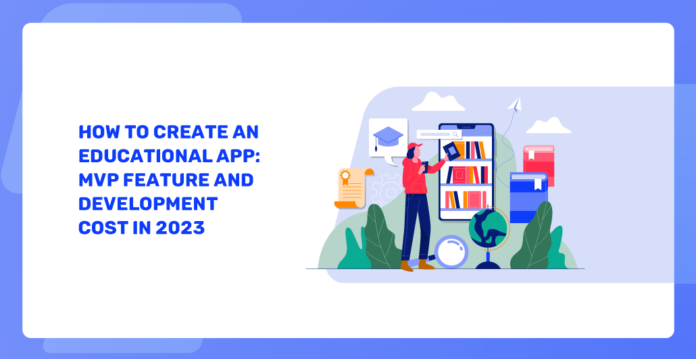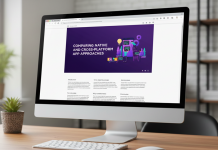INTRODUCTION
Due to the technological revolution, you must have observed that there are mobile apps for almost everything. As technology is evolving, every sector is now introducing an app for their business. Just like other sectors, the education sector is also approaching educational app development to enhance the teaching method and increase student reach.
Statista estimates that worldwide revenue from E-learning platforms could increase from $57 billion in 2021 to $64.50 billion by 2027. Almost all institutions are adopting E-learning. Thus, educational app development companies are in high demand.
In 2023, innovation and technology are the driving forces behind transforming traditional classroom learning. However, there are various things that one should consider for educational app development. That could include the features of educational apps, their cost, types, and process. So, to tell you everything about educational app development, we are here with this blog.
So, if you are also planning to launch an educational app or need education software, then you are reading the right blog.
Just buckle up and read on!
THE CONCEPT OF AN EDUCATIONAL APP
Before starting anything, you must have a clear understanding of its concept and meaning. So educational apps are software that provides educational content and tools to users for learning. Users can access these apps through their mobile phones, laptops, and tablets. These apps provide access to learning materials that are available 24/7. They can also use these apps in various educational settings, including classrooms and homes.
The concept of educational apps or e-learning is gaining immense popularity after the pandemic. As educational apps have the potential to change the way we learn and interact with information. These apps provide access to a vast array of educational content that helps students learn and grow in a way that is engaging and effective.
Moreover, educational apps allow students to learn at their convenience, regardless of their location or time constraints. In a nutshell, it is a revolution in the education sector.
TYPES OF EDUCATIONAL APPS
Educational apps are not just one type it has many types which are as follows:
1. Language Learning Apps
Language learning apps are for learning different foreign languages. These apps help users to learn a new language or improve their language skills. The popular language learning apps are as follows:
- Duolingo
- Babbel
- Rosetta Stone
2. Learning Management System Apps
These apps help to manage and deliver educational content online. Some popular LMS are:
- Canvas
- Blackboard
3. Classroom Education System Apps
Classroom education apps are specially developed for the setting of classrooms. Teachers use these apps to manage their classes. This also helps teachers to track students’ grades, homework, assignments, and other data. Additionally, these also help students to make notes, study for tests, and more. Some popular classroom education system apps are:
- Google Classroom
- Seesaw
- GoGuardian
4. Online Courses Apps
These kinds of apps provide access to online courses in the form of modules. Such courses can be crash courses or any other subjects. Some popular online course apps are:
- Udemy
- Coursera
5. Exam Preparation Apps
Students can learn for competitive exams with the help of these apps. By tracking and evaluating users’ progress and performance, this app category can either offer academic assistance or help users study more productively. Some popular exam preparation apps are:
- Khan Academy
- Byjus
- Magoosh
6. Kids Educational Apps
As its name suggests, Kids’ educational apps are specially designed for kids. It helps kids to learn and explore a variety of subjects in a fun and interactive way. Some popular kids learning apps are:
- ScratchJr
- ABCmouse
ESSENTIAL FEATURES SHOULD BE INCLUDED IN EDUCATIONAL APP
The features of educational apps depend on the type of app and the major users i.e, students and teachers. Features for both users (Students and Teachers) are mentioned below:
1. For Students
- Registration signup / Login: This feature allows students to create an account on the app by providing their basic details like name, email address, and password. Once registered, they can log in to access the app’s features and resources.
- Profile Management: This feature enables students to manage their profiles by adding or editing their personal information, uploading their photos, and tracking their progress on the app.
- Offline Access: This feature allows students to access the app’s content even when they are not connected to the internet. They can download the resources beforehand and access them later when offline.
- Search option with filter: This feature helps students search for specific topics, modules, or resources available on the app using keywords or filters to narrow down their search results.
- Payment Integration: This feature enables students to make payments for the app’s premium features, courses, or modules through various payment gateways like credit cards, PayPal, or online banking.
- Chatbot: This feature provides an interactive platform for students to ask questions, clarify their doubts, and get instant responses from the app’s chatbot or virtual assistant.
- Live Sessions: This feature allows students to attend live sessions, webinars, or online classes conducted by the app’s instructors or educators.
- Test: This feature provides various online tests or quizzes for students to assess their knowledge, skills, and progress on the app.
- Module Download Options: This feature enables students to download various modules or resources available on the app for offline access or further reference.
- Notification: This feature keeps students updated about the latest announcements, events, or activities happening on the app through push notifications, emails, or SMS alerts.
2. For Teachers
- Registration Signup / Login: This feature allows teachers to create an account on the app by providing their basic details like name, email address, and password. Once registered, they can log in to access the app’s features and resources.
- Student Profile Management: This feature enables teachers to manage their students’ profiles by adding or editing their personal information, uploading their photos, and tracking their progress on the app.
- Exam and Test: This feature allows teachers to create, schedule, and conduct exams or tests for their students online. They can set different types of questions, assign marks, and evaluate the responses received.
- Test: This feature provides various online tests or quizzes for teachers to assess their knowledge, skills, and progress on the app.
- Module Upload Options: This feature enables teachers to upload various modules or resources like assignments, projects, presentations, or study materials for their students to access and download.
- Notification: This feature keeps teachers updated about the latest announcements, events, or activities happening on the app through push notifications, emails, or SMS alerts. They can also send notifications to their students about upcoming tests or assignments.
COST OF EDUCATIONAL APP DEVELOPMENT
The cost of educational apps depends on various factors of an app. These factors can be the features of educational apps and the platform on which the app will deploy. Moreover, the major factor that influences the cost of development is the location where the education software development company is situated. Hence, we are giving you a rough estimation of costs as per the different factors. You can read them below:
1. Platform
iOS: Developing an educational app for iOS can cost anywhere from $10,000 to $100,000, depending on the complexity of the app and the location of the development team.
Android: Developing an educational app for Android can cost anywhere from $10,000 to $100,000, depending on the complexity of the app and the location of the development team.
Both iOS and Android: Developing an educational app for both iOS and Android can cost anywhere from $20,000 to $200,000, depending on the complexity of the app and the location of the development team.
2. Features
Basic features: Developing an educational app with basic features such as course material, quizzes, and progress tracking can cost anywhere from $10,000 to $50,000.
Advanced features: Developing an educational app with advanced features such as gamification, virtual reality, augmented reality, and AI-powered chatbots can cost anywhere from $50,000 to $200,000 or more.
3. Location
North America: Hiring a development team in North America can cost anywhere from $100 to $300 per hour.
Eastern Europe: Hiring a development team in Eastern Europe can cost anywhere from $50 to $150 per hour.
India: Hiring a development team in India can cost anywhere from $20 to $50 per hour.
CONCLUSION
“EDUCATION IS A MOST POWERFUL WEAPON, WHICH YOU CAN USE TO CHANGE THE WORLD”
A famous quote by Nelson Mandela is now proven. Hence, because of the good education system we are growing towards a bright future and making impactful changes in every sector with technology.
Educational apps have the power to provide education to those who might not have access to traditional educational resources. Thus, it will be beneficial for an education system, if you adopt educational app development for your institute. With that, you can help by bridging the learning gap between different communities and creating a more equitable education system. Additionally, we made it possible for you with the above information.
Lastly, if you have decided to get an app then you can approach an Education software development company for your educational app development.















